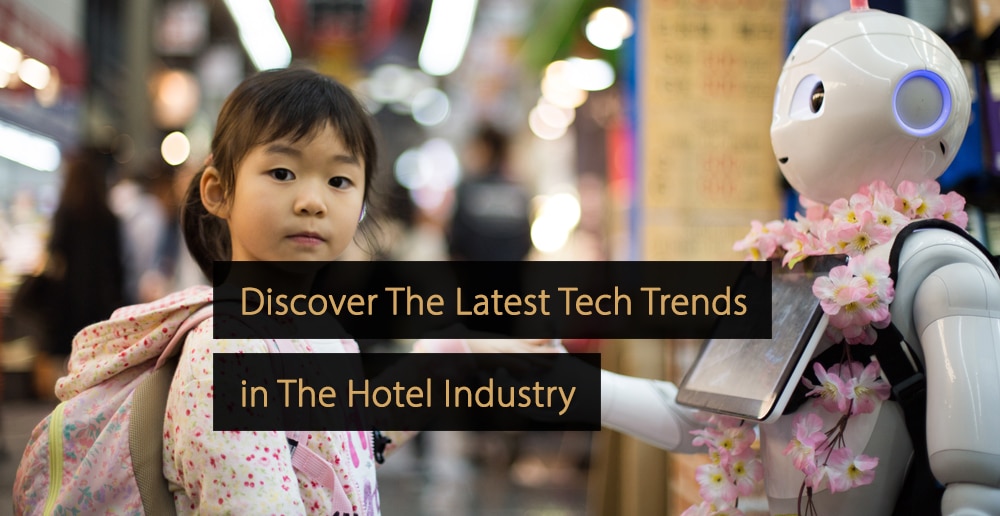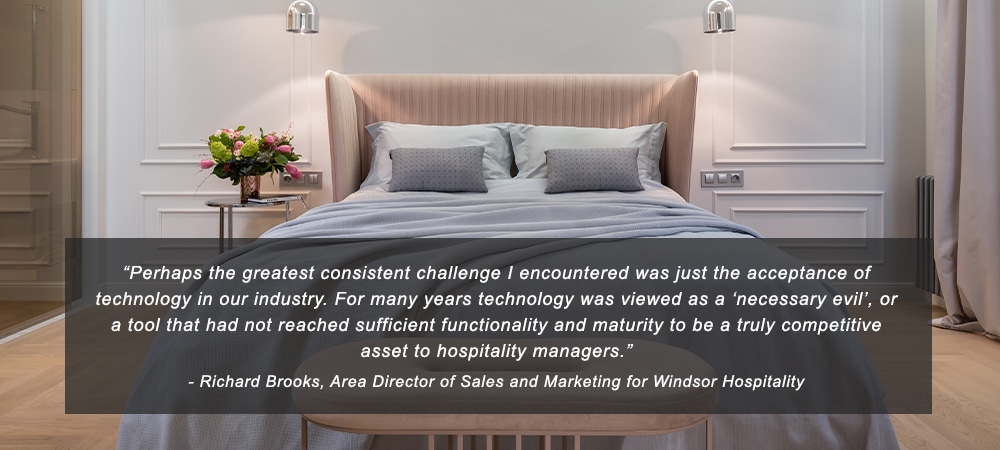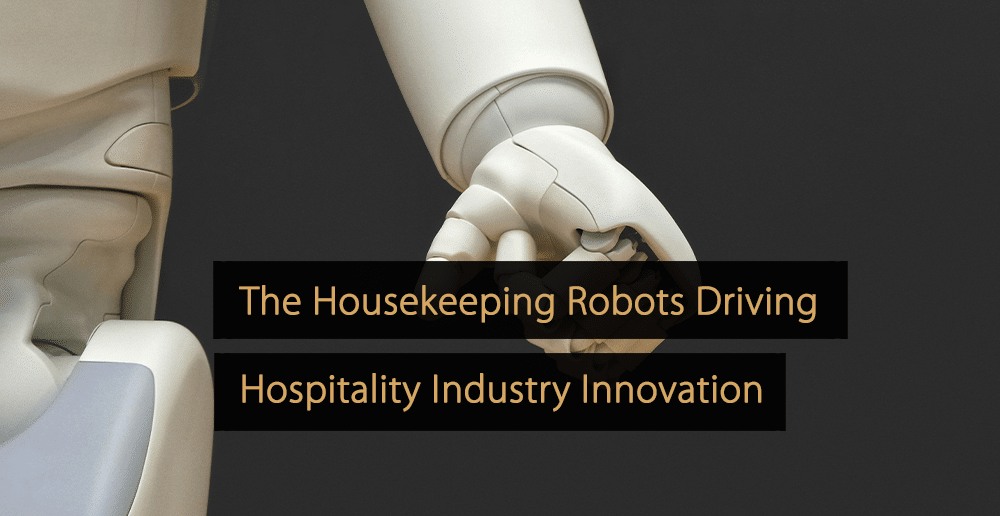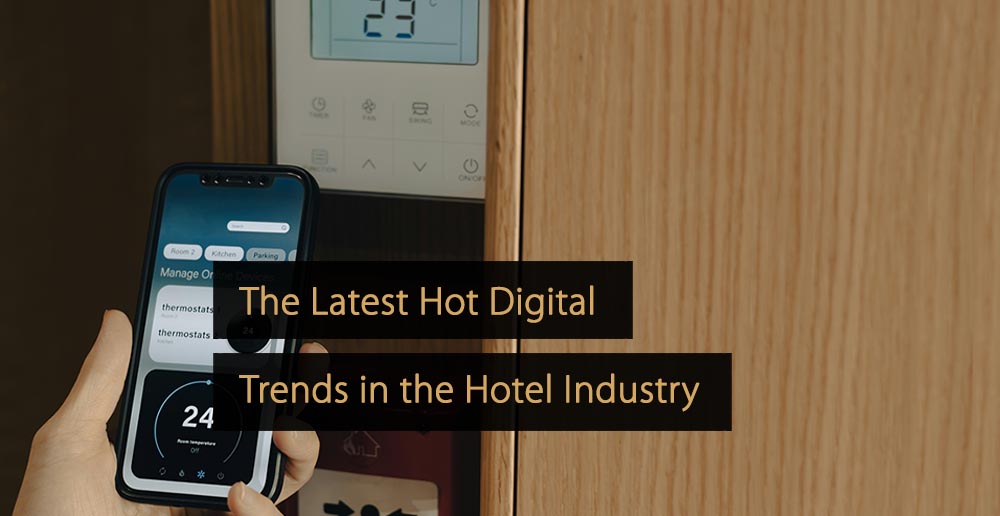Modern hotels appeal to customers in several ways, including the quality of customer service, the facilities on offer, the property’s design, and hotel technology. This technology is often used to deliver a superior customer experience. It is especially important to do so in the post-COVID era, when those customer expectations have changed, and people need more reassurance to travel. In this article, you can read the latest hotel technology trends for 2026.
Table of Contents:
- Why is Hotel Technology Becoming More Important?
- Hotel Technology Trends: Discover 26 Hotel Tech Trends of 2026
- 1. Automated Text Messages
- 2. Energy Positive Hotels
- 3. Biometric Hotel Technology
- 4. Integration of the Internet of Things (IoT)
- 5. Mobile Hotel Booking Options
- 6. Speech Recognition & Voice Control
- 7. Contactless Payments
- 8. Hotel Robots
- 9. Chatbots
- 10. ChatGPT Use for Hotels
- 11. Hotel Virtual Reality Tours
- 12. Mobile Check-In
- 13. Voice Searches
- 14. CyberSecurity
- 15. Hotel Revenue Management Technology Tools
- 16. Smart Hotels
- 17. Service Automation
- 18. Facial Recognition Technology
- 19. Artificial Intelligence (AI)
- 20. Translation Technology in Hotels
- 21. Your Own Hotel Smartphone App
- 22. Augmented Reality (AR)
- 23. Guest Apps
- 24. Big Data
- 25. WiFi 6
- 26. Hotel NFT Marketing Strategies
- The Metaverse and Hotel Technology Companies Are Embracing
Why Is Hotel Technology Becoming More Important?
Hotel technology is becoming more important due to increasing guest expectations for personalized, seamless experiences, the need for operational efficiency, and the competitive advantage that innovative solutions provide in adapting to changing market dynamics and enhancing overall profitability. The notion of “business as usual” within the hotel industry quickly evolves. While generic and so-called “cookie-cutter” services may have sufficed a handful of years ago, this is no longer true. Furthermore, the rise of the digital community signifies that competition is rife.
Hotels, therefore, need to leverage the resources and systems available to them if they hope to retain loyal clients. Hotel technology plays a significant role, and its presence will increase in the coming years. Let’s now take a look at eleven upcoming and interesting hotel technology trends within the hotel industry.
A Smart Hospitality Market Report projects the global hospitality tech market to surpass $30 billion by 2026, with a CAGR of over 25%, fueled by investments in AI, IoT, and automation. Meanwhile, Oracle Hospitality’s Guest Preferences Study found that 76% of travelers prefer hotels with self‑service technology. Furthermore, 84% of hoteliers agree that technology will be more important for the success of a hotel business in the next five years.
Hotel Technology Trends: Discover 26 Hotel Tech Trends of 2026
Below, you will find an overview of the newest hotel technology trends. Some innovations are due to general changes in consumer behavior and the progress of technical developments. Some changes are accelerated due to a shift in consumer behavior caused by the coronavirus pandemic.
1. Automated Text Messages
Automated text messaging is a great way for hotels to share important information and strategically communicate with hotel guests. Text messages can occur through conventional SMS telephone messaging or can be carried out through the use of a dedicated hotel app, depending on your specific strategy. According to an Oracle Hospitality and Skift survey, 77% of travelers are willing to use automated messaging for service requests, and nearly 50% of hoteliers plan to implement AI-powered chat features within the next three years.
Regardless of what hotel technology you use for this, messages should be sent at the right times. For instance, a welcome message after guests check in can help make a great first impression and provide information they can refer back to during their stay. Studies show that personalized welcome messages can increase guest satisfaction by up to 20%. Similarly, you might send a message asking for feedback after checking out.
Video: Automated Text Messages
2. Energy Positive Hotels
Modern hotel guests are more concerned than ever before about issues like sustainability, which is where the concept of the energy-positive hotel came from. An energy-positive hotel is a hotel or similar property that produces more energy than it uses. This excess energy can then be used to benefit others in the local community.
According to the Sustainable Travel Report by Booking.com, 76% of travelers want to travel more sustainably. A growing number of hotels are highlighting their green credentials in hotel marketing. A long-term study by Cornell University analyzing nearly 1,200 hotels found that green-certified properties generate 6% more monthly revenue and report 4.25% higher guest satisfaction scores compared to non-certified competitors.
Hotels could use wind and solar energy to power their property and hotel technology, then supply excess energy to local businesses or public services. Not only does this make the hotel more sustainable, it can also provide a massive PR boost and help offset some of the negative effects tourism may have on the local area.
A leading example is the Hampton Inn & Suites, which reduced its electricity bills by approximately 40% after installing a photovoltaic (solar) array. This move not only cut costs but also made it the first Hampton Inn & Suites to earn the U.S. Green Building Council’s certification for sustainable buildings, according to Solar Direct.
Video: World’s First Energy Positive Hotel
3. Contactless Payments
Contactless payments are among the single most crucial hotel technology trends, helping to improve the speed of transactions. In the past, this was restricted to contactless cards. Still, the more recent emergence of mobile wallets and wearables has expanded this area, providing customers with options even when they do not have their cards.
The market momentum is clear: the global contactless payment market was valued at $34.55 billion in 2021 and is projected to grow at a 19.1% CAGR from 2022 to 2030, according to Grand View Research.
While contactless payments have typically been seen as a convenience, they have emerged as much more of a necessity in the wake of the coronavirus pandemic. Many customers are reluctant to handle cash or use keypads to enter their PIN, while using contactless methods as much as possible can also help keep your employees safe.
According to a Global Payments Hospitality Report, 65% of hospitality businesses plan to prioritize tap to pay methods, and research shows 73% of millennials and 66% of Gen Z actively embrace contactless payment options.
Major hotel brands are leading the way. For example, Hilton has integrated Apple Pay, Google Pay, and Samsung Pay across restaurants, spas, and recreational outlets to create a seamless, secure experience at every touchpoint.
Video: Contactless Payments – How Does it Work?
Read “Contactless Payments Are Becoming More Important Within Hospitality” for more on this hotel technology.
4. Biometric Hotel Technology
Biometrics refers to the use of biological and physical characteristics to verify identities. This can include technology like iris or retina scanning, fingerprint scanning, and facial recognition. Embracing biometrics is becoming increasingly important for providing security and convenience. Technology like fingerprint scanning and facial recognition can verify who someone is and restrict access to approved individuals.
According to Grand View Research, the global biometric technology market size was valued at USD 34.27 billion in 2022 and is projected to reach USD 150.58 billion by 2030, growing at a CAGR of 20.4% from 2023 to 2030.
In terms of current hotel technology trends, examples include using fingerprint scanning to provide access to rooms, or using facial recognition to speed up check-in processes. Biometrics technology can also assist with security, helping a hotel to know how many people are in the property, who they are, and when they arrived. In addition to boosting security, biometrics can improve efficiency by removing manual identity checks.
Terry Schulenburg, VP of business development at CyberLink, stated:
“We will see several hotels roll out biometrics in 2024 and 2025. There are some very important guidelines that hotels are following to protect their customers’ privacy and will incentivize the use of biometrics”.
Video: Biometrics for hotels
5. Integration of the Internet of Things (IoT)
The Internet of Things (IoT) is a term used to describe ordinary devices with internet connectivity and communication capabilities. According to a PwC survey, 70% of hospitality executives reported that they already had active IoT projects in the works. This can include everything from refrigerators and smart TVs to entire HVAC systems. Integrating IoT devices into your hotel technology can offer benefits in terms of automation, remote control, and monitoring of devices. This can also make it easier to maintain devices and carry out timely repairs.
Smart devices can help to provide a greater level of personalization, such as allowing guests to set their preferred room temperature or light levels, with the room automatically adjusting the devices to match this. The ability to monitor and even control devices remotely can also make it easier to respond to certain customer service requests, such as if a guest has a problem with their heating or the television in their room. The global IOT in Hospitality market size is expected to reach USD 251.6 billion by 2033, growing at a CAGR of about 28% during the forecast period.
One great example is Marriott International’s IoT Guestroom Lab. The technology inside the IoT Guest Room Lab allows, for instance, a user to ask a virtual assistant for a 6:30 AM wake-up alarm, to start a yoga routine on a full-length mirror, request additional housekeeping services, and start the shower at the desired temperature stored in their customer profile, all by voice or app.
Video: How IoT is Revolutionizing the Hospitality Industry
6. Mobile Hotel Booking Options
Mobile hotel booking solutions allow guests to reserve a room in your hotel using an app or mobile-optimized website. This provides more convenient booking options, up-to-date availability information, and rapid confirmations. Providing mobile-optimized booking options is essential because a large amount of hotel business now originates from mobile devices. Offering this convenience also allows you to capture last-minute bookings made while people are out.
A hotel booking app is becoming one of the most critical hotel technology options, and this can integrate booking with a customer loyalty program and other features, such as mobile check-ins. According to the Trends Global Survey, 80% of global travelers surveyed feel it is important to be able to book their trips entirely online, with 86% of Millennials and 83% of Gen Zers leading the charge. 76% of global travelers said they look for travel apps that reduce the friction and stress of travel.
However, your hotel website must also be optimized so it is easy to navigate and complete a booking using a touchscreen. As an added bonus, a mobile app also allows you to capture valuable customer data, which can then be used for personalization, upselling, or to improve the overall service standards in your hotel.
7. Speech Recognition & Voice Control
Speech recognition hotel technology can provide guests with options to control in-room devices using their voice. It can also be used by hotel employees for identity verification or for voice-controlled systems. This hotel technology is important because many people are comfortable utilizing smart assistants on their phones and smart speakers in their homes. It also offers accessibility advantages for disabled guests.
When deployed effectively, voice recognition and voice control technology can improve hotel staff efficiency and provide guests with a hands-free option for activating devices. Smart speakers in hotel rooms can also potentially answer basic questions, reducing customer service requests. Based on information from Straits Research, the global voice and speech recognition market size is projected to reach from USD 17.33 billion in 2025 to USD 61.27 billion by 2033, growing at a CAGR of 17.1%.
Wynn Las Vegas became the world’s first hotel to fully integrate Amazon Echo devices across all 4,748 guest rooms. A joint survey by Alexa and Wynn of over 40,000 guests revealed that 85.6% found Alexa easy to use, 83.7% were happy with the service, and 66.8% would specifically request an Alexa-enabled room. Today, over 40% of guests actively use Alexa for room and TV controls, streamlining service requests and reducing front desk pressure.
Steve Wynn, Chairman and CEO of Wynn Resorts, noted:
“As we have moved through the years, technology has always played an important part in our resorts. The thing that Amazon has done with Alexa is quite perfect. If I have ever seen anything in my 49 years of developing resorts that has made our job of delivering a perfect experience to our guests easier and help us get to another level, it is Alexa. The ability to talk to your room is effortlessly convenient.”
Video: PolyAI Voice Assistant Industry Demo: Hotel Concierge
8. Hotel Robots
Robots are among the fascinating hotel technology trends because it is a technology that is improving rapidly. Already, there are examples of hotels that have used robots for things like greeting guests upon arrival or providing tourist information on a 24/7 basis. Still, the uses are now extending far beyond this, too.
According to Market Research Future, the global hospitality robots market is experiencing explosive growth, with market size projections ranging from USD 472.51 million in 2024 to USD 2,907.71 million by 2032 at a CAGR of 25.5%. This technological revolution is being driven by labor shortages, rising operational costs, and evolving guest expectations for contactless services.
Hotel robots have the potential to assist with housekeeping activities, such as vacuuming floors and killing germs, which can be especially important for making your property COVID-19 secure. However, some hotels also utilize robots for luggage transportation, security, room service, and restaurant waiting.
It is a technology that will continue to expand in the years ahead as robots become more reliable and better equipped to improve performance over time through artificial intelligence and machine learning.
Marriott has been at the forefront of integrating robotics into guest services. It’s Mario robot welcomes guests, assists with check-ins, inspects rooms, and even discusses menus. Additionally, Marriott partnered with Bear Robotics to deploy autonomous food delivery robots, and it also launched a pilot program to test autonomous cleaning robots across multiple properties. These integrations signal a serious long-term commitment to robotic solutions.
Tomeu Fiol, Global Hotel Technologies Director, says:
“Two technologies are revolutionizing the hotel industry. Artificial intelligence (AI) and robotics. While AI grabs the spotlight, robotics, which receives less attention will have an undeniable impact.”
Video: Alibaba’s ‘Future Hotel’ Uses Robots
Video: Germ-Killing Robots to Cleanse Hotel Rooms
Find more detailed information and examples of robot use cases in the hotel industry in the articles “Examples of Robots Being Used in the Hospitality Industry”. and “Hotel Robots: An Overview of Different Robots Used in Hotels”.
9. Chatbots
Chatbots and online widgets are standard on many websites and can form a vital part of a modern hotel technology marketing strategy. However, they are now being deployed on things like Facebook Messenger and WhatsApp. The main benefit here is the ability to provide customers with swift answers to questions at all times of the day. According to Hotel Tech Report’s State of Guest Technology, 70% of hotel guests find chatbots useful for quick questions, with the top use cases being Wi-Fi password requests, wake-up call scheduling, and checking hotel facility operating hours.
Some chatbots can also be configured to communicate in different languages, offering a more comprehensive customer support experience. The importance of chatbots has also grown in the wake of COVID because customers will often have questions about policies and procedures, which can usually be answered effectively by bots.
Hilton’s Xiao Xi Chatbot is a great example. The chatbot assists Hilton members and guests with answers to questions, including hotel information, local weather, and current promotions. With a 94% customer satisfaction rating, Xiao Xi has replied to more than 50,000 customer queries since its launch
Video: Example Hotel Chatbot
Video: Book a Hotel With Chatbot
Check out the articles “Reasons Why Every Hotel Needs a Hotel Chatbot” and “What Are the Important Features When Choosing a Hotel Bot?” for more information.
10. ChatGPT Use for Hotels
ChatGPT is disrupting a large number of industries, and the AI tool can also be considered an example of hotel technology. According to Forbes, 32% of travelers are likely to use ChatGPT to plan a trip. In particular, it is useful for automating the creation of content or reducing costs in a number of key areas. While it needs to be used carefully, it has great potential to assist hotels and hotel staff.
In the “ChatGPT Hotel Guide: Learn How Hotels Can Benefit from ChatGPT!” article, you can find out much more about how ChatGPT works, its key advantages, and some of the specific ways hotels can use the technology.
Video: Chat GPT by Open AI
11. Hotel Virtual Reality Tours
Virtual reality, or VR for short, is a technology that involves creating a digital environment for users to explore. According to the Virtual Reality Market Report by Fact.MR, the global market size of virtual reality is projected to reach $233.79 billion by 2033. It is especially effective for those in hotel management because it allows you to present a digital recreation of your hotel for users to check out from the comfort of their own homes.
In many ways, VR is the ultimate way to experience a hotel before making a booking, and many hotel websites are turning to VR tours and 360 videos during the booking process to attract additional sales. With concerns about COVID, VR tours can be especially useful, helping customers to understand exactly what to expect during their stay.
Most virtual reality tours can be viewed in a standard web browser on a computer, mobile, or tablet, making it a widely accessible hotel technology. However, the experience can be enhanced with a dedicated VR headset.
Video: Pullman Brisbane King George Square Virtual Reality Hotel Tour
Find more detailed information and examples about how virtual reality can benefit your hotel in the articles “How Virtual Reality (VR) Can Enrich the Hotel Industry”. and “Reasons Why Every Hotel Should Have a Virtual Reality Video“.
12. Mobile Check-In
Mobile check-in technology allows customers to check in using a mobile app. In this sense, it shares similarities with contactless payments because they both aim to reduce friction for customers. Additionally, these hotel tech trends can improve convenience and enhance the customer experience by reducing waiting times. Nearly three-quarters (73%) of travelers want to use their mobile device to manage their hotel experience, including checking in and out, paying, ordering food, and more.
The mobile check-in option can help hotels move away from having set times where guests need to check in because the check-in process can be carried out without human interaction. For this reason, it is also a good piece of hotel technology to highlight in your COVID-related marketing efforts.
According to an Oracle Hospitality Recovery Survey, digital room keys (26%) and digital messaging services (20%) are among the top three changes that would make them feel more comfortable staying in a hotel. About 71% of hotels are moving towards mostly or completely digital check-in processes. Studies show that keyless entry leads to an average increase of 7% in guest satisfaction scores.
For example, Hilton’s Digital Key is now used in over 80% of its properties, reducing check-in time to under 60 seconds. Similarly, Marriott saw a 12% increase in guest satisfaction scores due to timely adaptations, including contactless check-in options.
You can learn more by reading our “Mobile Check-In App for Hotels: What Are The Benefits?” post.
13. Voice Searches
The rise of home-based gadgets such as Alexa and Siri has illustrated that the mechanics behind basic voice searches have evolved incredibly during the past few years. More detailed answers are provided, and employing these systems to augment existing hotel technology is much easier. In a hands-free world, this makes a great deal of sense. Guests can now book reservations or immediately contact a hotel representative using dedicated voice-activated applications.
This is quite beneficial while out and about. Voice technology is certainly set to replace traditional options such as static telephone numbers. According to the Industry Specific Voice Search Statistics by Synup, the global voice recognition market is projected to reach $26.8 billion by 2025. In an era partially defined by electronic immediacy, it only stands to reason that voice searches have been included within this list.
Video: Voice Search Within Hospitality
Video: Example Voice Control
Find more detailed information and examples about applying voice searches in the hotel industry in the article “How Can Voice Control Benefit the Hotel Industry?”.
14. CyberSecurity
Hotels are at an ever-increasing risk of encountering cybersecurity problems, ranging from loss of customer data to more malicious threats, such as phishing, DDoS attacks, and ransomware. For this reason, you need to make sure you invest in training and make use of cybersecurity tools. The importance of having the right cybersecurity protocols is heightened if your hotel technology has some of its employees working from home in response to the pandemic.
In these situations, employees may be using their own devices or connecting to your network remotely, which can introduce additional security risks that need to be considered. The hotel industry is a particular target for these threats because hotels handle a large amount of customer data and tend to have many employees, each with accounts that could potentially be compromised.
Research from Trustwave’s Hospitality Sector Threat Landscape report shows that 31% of hospitality organizations have reported a data breach in their company’s history, with 89% experiencing repeat breaches. The per-breach cost averages $3.4 million. However, Gartner estimates that there will be a 15% growth in cybersecurity spending in 2025, while also predicting that by 2027, 17% of all cyberattacks will involve generative AI.
For example, Marriott’s massive data breach affected approximately 500 million guests and was one of the largest cybersecurity incidents in the industry. The breach originated in Starwood’s systems, two years before Marriott’s acquisition. Marriott incurred nearly $30 million in overall recovery expenses. Additionally, the company paid a $52 million settlement to 50 U.S. states in 2024 and faced a £18.4 million fine from the UK’s data watchdog for GDPR violations, as reported in HospitalityNet’s analysis.
15. Hotel Revenue Management Technology Tools
Hotel Revenue Management (RM) technology tools have become indispensable for optimizing pricing, forecasting demand, and boosting overall profitability. These platforms leverage AI and data analytics to process real‑time market trends, competitor rates, and historical booking patterns.
Verified Market Reports shows the Hotel Revenue Management Systems Market size stood at USD 1.02 Billion in 2024 and is forecast to achieve USD 2.44 Billion by 2033, registering a 10.3% CAGR from 2026 to 2033.
Ryan Mummert, senior principal, insights and data portfolio leader at Capgemini, states:
“The rapid pace of technological change, including the adoption of AI and machine learning, requires significant investment in new systems and training for staff. Hospitality revenue managers must stay updated with the latest innovations to remain competitive, which can be resource-intensive.”

Celine Quek, Senior Lecturer, School of Hospitality at Republic Polytechnic“Business intelligence analytics tools and revenue management systems are essential investments for modern hoteliers. Today, hotels amass vast quantities of data, and the job of a revenue manager or a business analyst may be made much more difficult if information becomes difficult or time-consuming actually to locate. Using BI and revenue management tools, data from your PMS, POS system, customer relationship management software, and other sources can be centralized and organized logically. This then makes it easier to find and understand. It also means more time can be spent analyzing data, rather than simply locating it.” Click here to read more revenue management tips from our Revenue Management Expert Panel. |
16. Smart Hotels
“Smart” technology seems to have become an inextricable component of our daily lives. Its importance has not been lost within the hospitality sector. According to the Research and Markets report, the smart hospitality market is expected to reach $74.86 billion by 2029, with a CAGR of 26.1%. Automated checkout services, customized environmental settings within each room, Internet of Things (IoT) use, and wireless data linking are all becoming commonplace.
The ultimate goal is to provide guests with a fully customized experience. This will help to reinforce the brand identity of the hotel in question, and as a result, they are more likely to return in the future.
Video: Smart Hotel Solutions
You can read more detailed information and examples about how smart hotel rooms can benefit your hotel in the articles “Smart Hotel Room; What Are the Benefits for Hotel Owners and Guests” and “Ways to Transform a Hotel Room Into a Smart Room”.
17. Service Automation
Self-service automation intends to place the decision-making process in the hands of the guests as opposed to the hotel staff. This directly follows trends that have been witnessed across multiple sectors. A survey by the American Hotel & Lodging Association found that 67% of respondents said their hotel had a staffing shortage, and 72% were unable to fill open positions. These challenges drive interest in robotic concierges, AI chatbots, and automation to maintain service levels despite fewer staff.
Mews survey reveals that nearly 80% of travelers would already be willing to stay at a hotel with a completely automated front desk or self-service kiosk. Self-service kiosks, online registration, targeted feedback questionnaires, and options to pre-set the amenities within a room are now beginning to take center stage. However, this is not to say that traditional staff have been removed from the equation. Their services are rather being augmented with a heightened sense of in-house automation.
18. Facial Recognition Technology
Many consumers are just becoming accustomed to facial recognition technology, particularly regarding smartphone security. Still, it is important to mention that these same methods represent another important facet of modern hotel technology. The Facial Recognition Market size is estimated at USD 7.68 billion in 2025, and is expected to reach USD 16.27 billion by 2030, at a CAGR of 16.2% during the forecast period.
There are several benefits that facial recognition applications can provide for hotel management:
- Enhanced levels of security and privacy
- Only authorized personnel will be allowed to enter specific areas
- This method can be used in conjunction with electronic payments as another form of verification
For example, the Marriott Rand Tower Hotel in Minneapolis has already adopted this trend by installing Sentry Health Kiosks equipped with FaceMe® facial recognition technology. These kiosks perform temperature checks, mask detection, and even hand sanitizer dispensing.
Terry Schulenburg, VP of Business Development at CyberLink, stated:
“Fingerprint technology is a proven technology, but you must deal with the environment. Humidity, dry air, and other environmental elements all cause issues with fingerprint reads. In hotels, where multiple people will be using the fingerprint reader, the transfer of diseases can occur by touching the fingerprint pad after a sick person does. Additionally, fingerprint readers are some of the easiest to spoof because I can wear someone’s fingerprint on my finger and check in as someone else very easily. With facial recognition technology, you don’t have to worry about environmental conditions. … Nothing needs to be touched, and spoofing the system, even with a photo or mask, is nearly impossible.”
Video: Facial Recognition Check-in in Marriott China
In the article “Use Cases of Facial Recognition in the Hotel Industry”, find more detailed information about how your hotel can benefit from facial recognition.
19. Artificial Intelligence (AI)
It can be argued that AI represents the most profound example of how hotel technology is advancing. This is due in no small part to the fact that its presence can be seen in the majority of the systems mentioned above. The ultimate goal of artificial intelligence is to provide guests with a more seamless and streamlined experience during their stay. The AI in the hospitality and tourism market is expected to see exponential growth in the next few years. It will grow from $20.47 billion in 2025 to $58.56 billion in 2029 at a compound annual growth rate (CAGR) of 30.1%. According to industry experts, it is estimated that by next year, nearly 80% of hotels will have implemented artificial intelligence (AI) technology in some form.
There are several ways in which this can be accomplished:
- Collating and interpreting guest data
- Mapping and identifying user preferences to create a tailor-made accommodation package
- More targeted and effective marketing techniques
- The ability to proactively determine the efficacy of a publicity campaign
- Personalizing the entire guest experience
Artificial intelligence plays a profound role in hotel technology, and this method has only recently entered the mainstream marketplace. As its presence grows, it is reasonable for customers to expect a unique experience.
Video: The Impact of AI on improving hotel booking rates
Find more detailed information and examples of artificial intelligence use cases in the hotel industry in the article “How to use Artificial Intelligence in the Hotel Industry”.
20. Translation Technology in Hotels
Translation technology allows users to translate one language into another. This is one of the hotel technology trends that has seen significant improvements in recent times, largely driven by artificial intelligence and machine learning. According to Business Research Insights, the Translation Services Market size is expected to reach USD 52.87 billion by 2032, growing at a compound annual growth rate (CAGR) of 2.7% from 2024 to 2032.
Within the hotel industry, translation technology is invaluable because many guests may not speak the local language. When reliable translation technology is available, it breaks down communication barriers. According to CSA Research, only about 25% of internet users are native English speakers. By translating your website into additional languages, you can expand your audience by up to 75%.
AI-powered chatbots and AI-powered smartphone assistants are providing increasingly accurate results and delivering these results in real-time. This can allow for greater service standards when dealing with foreign guests. Translation technology also allows both text and spoken words to be translated quickly.
21. Your Own Hotel Smartphone App
A hotel smartphone app can be created to provide a variety of services for guests. This may include options to place room service orders, contact the front desk, make a restaurant table reservation, and more. Having your own hotel app is important for the guest experience, providing a single place for guests to turn to for essential services. It can also provide vital data, which you can use for analytics.
Nearly a quarter of consumers (23 percent) have at least one hotel or restaurant-branded app on their mobile device, and 70 percent of users are actually using the app at least once a week, according to Hotel Tech Report.
Having your own dedicated hotel app can help to facilitate mobile check-ins, contactless payments, and more. It also allows your hotel to send push notifications to guests’ phones and share important news and information. This hotel technology can also be promoted in your marketing content. After a guest makes a booking, you can send them an email with the booking details and a link to download your mobile app.
22. Augmented Reality (AR)
Augmented reality is intended to enhance the physical environment of the end-user via devices such as smartphones and tablets. Some applications within the hotel sector include offering in-house interactive elements (such as maps and points of interest), providing a digital history of the property, and supplying guests with relevant information when they are located within certain areas of the hotel (such as a menu if they happen to enter a restaurant).
Video: Example Augmented Reality Within the Hotel Industry
Find more detailed information and examples about how augmented reality can benefit your hotel in the article “How Augmented Reality is Transforming the Hotel Industry”.
23. Guest Apps
Smartphones have taken center stage in terms of daily communications. From chatting with friends to answering emails and purchasing products online, the fact is that the average consumer has come to depend upon such innovative applications.
This observation has not been lost within the hospitality sector. Hotels are now developing their own branded app selection so guests can enjoy an even greater level of connectivity and correspondence. Modern bundles offer features such as virtual payments, 360-degree tours of a room, and immediate contact with a concierge. Research commissioned by award-winning technology provider Criton reveals that 80% of hotel guests would download a hotel app that would enable them to check in, check out, and get all information about the hotel. The same study found that 73% would download and use an app as a digital key to open their room.
Robert Cole, Phocuswright Senior Research Analyst, explained:
“Mobile apps started as little more than condensed websites adapted for phone screen real estate. They then added booking engines, touchless check-in, mobile key, guest messaging, food ordering, Wi-Fi access, folio settlement, guest reviews and reward program management. Ultimately, hoteliers should be striving to become the home base for the guest destination travel experience, with the mobile app as the primary point of contact”
Video: Smart Guest App
24. Big Data
Big data represents one of the “catchphrases” of recent times, and for a good reason. The ability to collect, interpret, disseminate, and react to this information is critical for hotels. This is particularly relevant for large properties that might cater to the needs of thousands of guests monthly. According to Future Market Insights, the global tourism industry big data analytics market is estimated at USD 225.4 billion in 2023 and is projected to reach USD 486.6 billion by 2033, at a CAGR of 8% from 2023 to 2033.
By combining the data they gather and information available online, hotels can use big data to assist them with a revenue management strategy, identifying offers that might suit specific travelers or hotel guests, or embracing the proper sales and hotel marketing approaches.
For example, Marriott uses Big Data technologies across its hotel chain operations. Both unstructured and semi-structured datasets are used to forecast demand and determine a value for each individual room throughout the year.
Video: Example of Big Data and predictive analysis
Find more detailed information about big data in the hotel industry in the article “Ways Big Data Can Help Those in the Hotel Industry”.
25. WiFi 6
When it comes to hotel technology that has the potential to benefit guests and hotel staff alike, the emerging WiFi 6 is one of the single best examples. This represents the next generation of WiFi technology, and while it will not completely revolutionize how WiFi is used, it can greatly improve the user experience. According to Grand View Research, the global Wi-Fi 6, Wi-Fi 6E, and Wi-Fi 7 chipset market size was estimated at USD 39.03 billion in 2024 and is expected to grow at a CAGR of 13.6% from 2025 to 2030.
The data rate improvement associated with WiFi 6 is more than 30 percent, while throughput improvement over an entire network is around 300 percent. This means that more devices can be connected to the hotel’s WiFi and still perform as expected, facilitating video streaming, web browsing, smart device usage, and much more. Unless there is a specific application that requires higher bandwidth, most properties remain on Wi-Fi 5 today, with 20% of the market currently running on Wi-Fi 6.
Table: Differences Between Wi-Fi Generations
26. Hotel NFT Marketing Strategies
Non-fungible tokens, or NFTs, are still an emerging hotel technology, but they are showing particular promise in hotel marketing. In particular, hotels can sell NFTs in partnership with local artists or on behalf of business partners, and these NFTs can be thematically linked to the hotel itself, too.
According to Statista, the global NFT market is currently valued at approximately $21 billion and is projected to grow significantly, reaching $174 billion by 2026. According to Gartner, by 2026, 25% of people are expected to spend at least one hour per day in the metaverse, and around 30% of businesses are expected to have metaverse-related products or services available by that time.
Taking this idea to the next level, NFT technology can also be used to help facilitate digital transactions, which can benefit hotels exploring the metaverse and the creation of interactive virtual worlds. Furthermore, NFT technology can power a customer loyalty program or boost brand awareness on social media.
For more information about NFTs in the Hotel Industry, read “NFT Hotel Opportunities: How Hotels Could Use NFT Technology”.
The Metaverse and the Hotel Technology Companies Are Embracing
Many of the emerging hotel technology trends and digital trends hotel owners are already deploying can feed into the metaverse concept, including virtual reality headsets and other metaverse devices, NFT technology, blockchain technology, augmented reality, social media, and more.
Check out “How Can the Hotel Industry Take Advantage of the Metaverse?” if you are interested in learning more about what the metaverse means, how it can be defined, the ways hotels are already using this technology and the opportunities that hotels can capitalize on in the future, to maximize their investment.
Hotel Technology Trends FAQs
There is no doubt that cutting-edge hotel technology is here to stay. These eleven examples should shed some light on what customers can expect in the coming months. Offering second-to-none levels of convenience and flexibility, hotels need to be able to embrace these innovative methods if they hope to maintain a competitive edge within an increasingly digital marketplace.
Want to Learn More About Technology in Related Industries?
It is essential to be aware of all the upcoming technological trends in the hospitality & tourism-related industries. While some trends can affect multiple industries, some are very specific for the industry. You can learn more about technology trends in related industries in the following articles.
- The Latest Technology Trends in the Hospitality Industry
- Key Technology Trends Emerging in the Travel & Tourism Industry
- Latest Restaurant Technology Trends You Need to Know About
- ChatGPT Hospitality Guide: How ChatGPT Can Help the Hospitality Industry
- ChatGPT Travel Guide: How the Travel Industry Can Benefit!
- ChatGPT Tourism Guide: How the Tourism Industry Can Benefit!
More Tips to Grow Your Business
Revfine.com is the leading knowledge platform for the hospitality and travel industry. Professionals use our insights, strategies, and actionable tips to get inspired, optimize revenue, innovate processes, and improve customer experience.Explore expert advice on management, marketing, revenue management, operations, software, and technology in our dedicated Hotel, Hospitality, and Travel & Tourism categories.








Great list. Just to expand on the chatbot section. Many hotels using smart messaging technology to engage with guests via quick and simple text messages. This alleviates the need for guests to download anything and can communicate with hotel staff anytime during their stay and are not tied to hotel specific apps or devices. Messaging will continue to be a great driver for guest engagement and loyalty in the future.
Great article, but what a difference a year makes… Now more than ever cleaning and safety protocols are tied to hotel brands. I would love to see a follow-up story about hotel technology trends that is focused on that.
Hi Raymond, thank you for your suggestion. We just updated the article with the latest general and COVID related hotel tech trends.
Hey, good information. Can we have details on the technology providers for each of these?
An excellent list of new technologies for the hotel industry. I used it for my study of hotel management at UFMA.